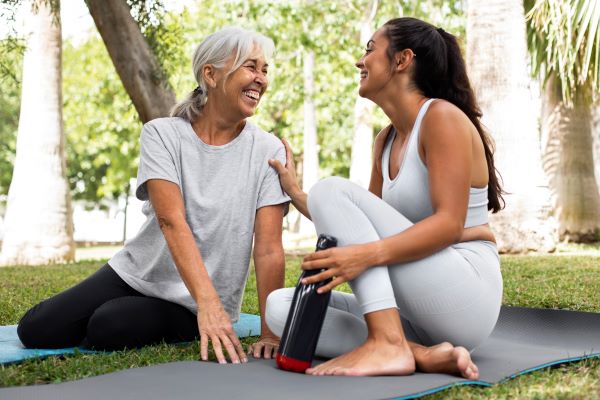Catching up with a friend on a call made from your rotary dial phone versus sending a short and sweet text from your smartphone to find out all of your family’s latest life updates.
Piling into the van for a drive-in movie and munching on hot dogs and popcorn from the concession stands versus cuddling on the couch with your partner flipping through streaming sites for a cosy movie night in.
Frantically unfolding maps that spread across the whole dashboard vs googling the address of your destination and entering it into your GPS.
Talking to a telephone operator vs talking to Alexa.
It's inevitable—As time slips by and the world continues to evolve, a disconnect tends to develop between older and newer generations.
However, it doesn’t have to be this way.
If all of us took the time to learn, listen to each other's experiences, and show empathy, we would be able to bridge the communication gap between generations.
5 Talking Tips to Make More Meaningful Conversations with Seniors
1. Don’t Talk Down to Them—They're Not Children
Oftentimes, people tend to infantilise seniors, despite their several accumulated years of wisdom and life experience. As you can imagine, this can be extremely frustrating and demeaning to older people.
Old people are not children, so do NOT talk down to them as if they are.
They are fully grown human beings—the same as you and me—who have more than likely already experienced many of the same struggles, feelings, and situations that people younger than them are currently going through.
No one is wiser or stronger than someone who has conquered the challenges of life, coming out better and braver on the other side.
Pay seniors the same respect and fair treatment that they, as well as every other human being in the world, deserve.
2. Ask Them Questions About Themselves
Many seniors already feel invisible or inferior in today’s society as it is, often shoved into the background, ignored completely, or worst of all, taken advantage of.
Furthermore, seniors are often stereotyped as leading boring lives after retirement, consisting of only open-mouthed naps and watching game shows on a tv that is turned up to the highest sound volume.
Sadly, it isn’t too often that younger people try to befriend them or even bother to ask them questions about themselves.
People often forget that seniors are also interesting people who lead unique lifestyles, pursue their own personal passions, and possess several exciting stories and experiences to share.
Just as you would do to get to know any other person better, remember to ask them questions about themselves, their lives, and their experiences.
Being younger doesn’t equate to leading more important or exciting lives.
3. Speak Clearly—Not Condescendingly
There is a difference between speaking clearly and speaking condescendingly. Remember that when talking to an older person you’re going for clear communication—Never condescending.
Some examples of speaking condescendingly include:
- Slowing down speech to the speed of babytalk
- Overenunciating your words
- Explaining concepts that the other person already knows
- Giving unsolicited advice
- Talking with the same tone that you use with pets or children
- Raising the volume of your voice to the point where you are almost shouting
Essentially, being condescending is using any type of language or exhibiting any kind of behaviour that implies that the other person is inferior. This type of communication is not only aggravating to older people but also deeply insulting and harmful to their overall self-esteem.
Speaking clearly, however, is entirely different. Speaking clearly is helpful to older people who may suffer from some form of hearing or memory loss, as well as cognitive impairments.
Most importantly, it does not damage their self-esteem because you are still treating and talking to them as the equals that they are.
Some examples of speaking clearly include:
- Talking at a moderate pace with a normal tone of voice
- Refraining from using slang or jargon that older generations may not be familiar with
- Avoiding mumbling your words
- Slightly raising the volume of your voice so you are better heard
- Making eye contact
- Directly facing them
- Minimising background noise
- Use more visual cues such as gestures, facial expressions, and body language to better get your point across
4. Really Take the Time to Listen—Show Interest in What They’re Saying
No matter your age, we could all afford to become better listeners.
In many scenarios, we have the best of intentions to be completely invested in what someone is saying. However, at the same time, it is easy for us to think that we are truly listening to someone without actually processing and retaining what they’re saying.
Oftentimes, this happens when we are attempting to multitask, with distractions that divert attention away from the person you’re talking to. The person’s captivating story that you were listening to can quickly fade into a droning background voice.
No matter the age of the person you are talking to, actively listening to someone requires giving them your full, undivided attention, limiting distractions such as your cell phone, practising patience, refraining from interrupting, and asking them follow-up questions for better understanding.
When talking with seniors who, sadly, may not be used to being truly listened to or someone actually wanting them to share one of their stories, exhibiting signs that you are really listening and showing interest can help build their confidence and trust.
Some examples of visual, verbal, and behavioural signs you can exhibit to show the senior that you are listening to what they are saying include:
- Maintaining eye contact
- Facing them directly
- Minimising distractions by, for example, turning off your phone
- Nodding your head
- Making encouraging noises that indicate you are following such as “mm hmm” or “okay”
- Providing verbal cues that you’re listening such as commentary, reactions, and follow-up questions
- Validating their emotions by acknowledging how they feel or felt in the moment
- Making an effort to empathise with them and put yourself into their shoes
- Leaning in slightly with an open and receptive posture
The irreplaceable feeling of knowing that you’re being heard, valued, understood, and that someone cares about what you have to say, allows a stronger connection and bond to develop between the two of you.
5. Practise Empathy—Try to Understand Where They’re Coming From
If we are lucky enough, all of us will grow old someday.
However, ironically, despite this, WHO reports that a shocking 1 in 2 people in the world are ageist against older people.
It’s inevitable that every generation will have different experiences than the next to some degree, but that doesn’t mean that we cannot put in the effort to try and understand each other, despite our differences.
Showing empathy towards others is not just a kind thing to do but it actually has a significant impact on the overall health of older people.
In fact, studies have shown that empathy can positively impact physical and mental health outcomes for older adults.
Empathetic interactions have been proven to have the power to reduce stress, anxiety, and depression, leading to improved overall health and well-being.
Beyond this, empathy just demonstrates respect for the dignity and worth of older individuals that every individual deserves.
Growing older can sometimes be accompanied by societal biases or ageism, where older adults may feel marginalised or undervalued.
However, by showing empathy, you are recognising their inherent worth and treating them with the respect they deserve.
When everyone makes an effort to try to understand others, neither race, religion, age, nor generation can divide us, despite our differences.

